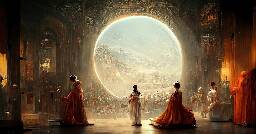Why This Award-Winning Piece of AI Art Can’t Be Copyrighted



wired.com
Why This Award-Winning Piece of AI Art Can’t Be Copyrighted::Matthew Allen’s AI art won first prize at the Colorado State Fair. But the US government has ruled it can’t be copyrighted because it’s too much “machine” and not enough “human.”
You are viewing a single comment
This will change the first time a big pharma pill designed by AI hits the market.
Or really anything that's more practical than art.
Or someone figured out how to reliably tune AI to just happen to generate existing art and tries to use it to bipass/invalidate the copyright on that piece of art.
You can already do that with over fitting or getting lucky with duplicates in the dataset(<6*10^-5% chance for stable diffusion). The resulting work is still protected under the original creator's copyright because it's almost identical. Same way that if you photocopy an image it doesn't remove the copyright even though slight details will be off due to inaccuracies.
Drugs are patented, not copyrighted, and handled by the US Patent Office. This is a decision by the US Copyright Office.
Not the same thing, and I would not be surprised if the Patent Office decides drugs designed in part with AI tools can still be patented, while the Copyright Office decides art cannot be copyrighted.
I look forward to trusting my medical well-being to algorithms which can be completely fucked by the idea that Kenya starts with the letter K.
AI are already generating antibody treatments. Companies provide AI with the disease/issue and antibodies that kinda work, then have the AI generate antibodies to fix the disease/issue. The best antibodies are then made in a lab and tested in vitro. However, as somone else noted, antibodies/medications are patented, which is different than copyright. Patents can be done on the process of making the antibody so you patrent the final process of making the antibody, not the AI work to come up with which antibody to make. Source: I attended a Patent Law seminar on this a few months ago.
They'll just say this random scientist over here that signed away to the rights of anything he thinks of came up with it.